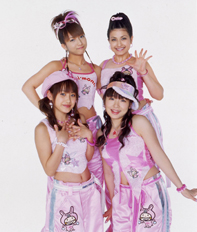
Morning Musume '21, formerly simply Morning Musume and colloquially referred to as Momusu, are a Japanese girl group, holding the second highest overall single sales on the Oricon charts as of February 2012, with the Oricon record of most top ten singles with an amount of 64.

Ai Kago is a Japanese actress and former singer. In 2000, Kago debuted as a 4th generation member of the idol girl group Morning Musume. During her time in the group, she was also part of Mini-Moni and other Hello! Project sub-groups. In 2004, Kago departed from Morning Musume and became part of the duo W with Nozomi Tsuji.
Nozomi Sugiura, known professionally by her birth name Nozomi Tsuji is a Japanese media personality, singer, and blogger. In 2000, she began her career as a singer for Japanese girl band Morning Musume. Tsuji later found success with related groups Mini Moni and W. She has participated in the shuffle groups 10-nin Matsuri, Odoru 11, and 11Water, H.P. All Stars, as well as being a member of the Morning Musume splinter group Morning Musume Otomegumi

Hitomi Yoshizawa is a Japanese former singer and actress. In 2000, Yoshizawa debuted as a 4th generation member of the idol girl group Morning Musume and became their leader in 2005 until leaving the group in 2007. Following her departure, Yoshizawa continued to appear in several music projects, including Hangry & Angry, Abcho, and Dream Morning Musume.

Ai no Dai 6 Kan is the sixth album from the J-pop idol group Morning Musume. The album was released on December 8, 2004.
Tanpopo, formed in November 1998, was the first official subgroup of Japanese pop idol girl group Morning Musume. While the main group Morning Musume features predominately upbeat songs with a fast tempo, Tanpopo featured slower tempo, sentimental and retro-style songs.

Mini-Moni was a sub-unit of the Japanese idol girl groups Morning Musume and Coconuts Musume. It was formed by Up-Front Promotion in 2000 and associated with Hello! Project. The group was founded by Morning Musume members Mari Yaguchi, Nozomi Tsuji, and Ai Kago, with Coconuts Musume member Mika Todd later added as a member. After Yaguchi's departure in 2002, Morning Musume member Ai Takahashi was added into the group.

"Roman " is the twenty-second single of idol group Morning Musume and was released May 12, 2004. It sold a total of 87,255 copies. The single peaked at #4 on the weekly Oricon charts, charting for six weeks.

"Minihams no Ai no Uta" is the third single of the Morning Musume subgroup Minimoni. It was released on December 5, 2001 and sold 325,440 copies, reaching number three on the Oricon Charts.

"Minimoni Jankenpyon!/Haru Natsu Aki Fuyu Daisukki!" (ミニモニ。ジャンケンぴょん!/春夏秋冬だいすっき!) is the first single by Morning Musume subgroup Minimoni. It was released on January 17, 2001 and sold 763,380 copies. It peaked at number one in Japan on the weekly Oricon chart, charting for seventeen weeks.

"Minimoni Telephone! Rin Rin Rin/Minimoni Bus Guide" is the second single by Morning Musume subgroup Minimoni. It was released on September 12, 2001 and sold 341,560 copies. The single reached #1 on the Oricon weekly chart, charting for sixteen weeks, making it the group's second consecutive single to reach the top spot on the weekly Oricon chart.

"Minimoni Hinamatsuri!/Mini Strawberry Pie" (ミニモニ。ひなまつり!/ミニ。ストロベリ〜パイ) is the fourth single of the Morning Musume subgroup Minimoni. It was released on January 30, 2002 and sold 325,440 copies, reaching number two on the Oricon Charts.

"Aiin Taisō/Aiin! Dance no Uta" (アイ〜ン体操/アイ〜ン!ダンスの唄) is the fifth single of the Hello! Project subgroup Minimoni. It was released on April 24, 2002 and sold 212,230 copies.

"Genki Jirushi no Ōmori Song/Okashi Tsukutte Okkasi~!" is the sixth single of the Morning Musume subgroup Minimoni, jointly credited to Minimoni to Takahashi Ai + 4Kids (ミニモニ。と高橋愛+4KIDS). It was released on November 27, 2002 and sold 53,681 copies. It peaked at number nine on the Oricon Charts in Japan.

"Minihams no Kekkon Song" (ミニハムずの結婚ソング) is the seventh single of the subgroup Minimoni, their second under the alias Minihams, and their last single with Mari Yaguchi. It was released on December 4, 2002 and sold 60,001 copies, reaching number ten on the Oricon Charts.

"Minimoni Kazoe Uta /Minimoni Kazoe Uta " (ミニモニ。数え歌〜お風呂ば〜じょん〜/ミニモニ。数え歌〜デートば〜じょん〜) is the ninth single of the Morning Musume subgroup Minimoni. It was released on May 14, 2003 and sold 29,088 copies, reaching number nine on the Oricon Charts.

"Mirakururun Grand Purin!/Pi~hyara Kouta" (ミラクルルン グランプリン!/ピ~ヒャラ小唄) is the eleventh single of the Morning Musume subgroup Minimoni. It was released on November 19, 2003 and sold 16,410 copies, reaching number 22 on the Oricon Charts.

"Lucky Cha Cha Cha!" (ラッキーチャチャチャ!) is the twelfth and last single of the Morning Musume subgroup Minimoni. It was released on April 21, 2004 and sold 34,398 copies. It peaked at number six on the Oricon Charts. Its title track was used as the theme song to the miniseries Minimoni de Bremen Ongakutai.

Minimoni Song Daihyakka Ikkan (ミニモニ。ソング大百科1巻) is the first album of the Morning Musume subgroup Minimoni. It was released on June 26, 2002 and sold 187,470 copies.
Up-Front Group Co., Ltd. is a Japanese holding company for various entertainment companies. Its subsidiaries include the talent agency Up-Front Promotion and Up-Front Works, a music production and sales company that manages such record labels as Zetima, Piccolo Town, and Hachama.

















